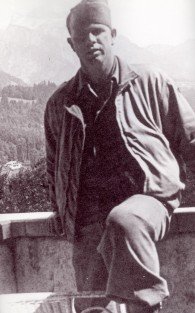John Wesley Hall Sr.

JOHN WESLEY HALL SR., pictured here at age 24 on the porch of Hitler's Berghof retreat in April 1945, died of Alzheimer's on June 30, 2010. He was one of 80 World War II veterans honored at the 60th Anniversary of D-Day at Colleville-sur-Mer, France. His World War II experience had a profound influence on him. Former owner of Black and White Cab Company and a North Little Rock representative on the Pulaski County Quorum Court, Hall was born in Basket Station, Ky. on May 10, 1920. He quit school in a futile effort to save the family farm from foreclosure during the Great Depression, went to work in the Kentucky coal mines, and by age 16 was self-employed selling fish on the Ohio River at Evansville, Indiana. His experience as a coal miner saved his life during WWII when he had to dig fox holes to sleep in. Hall enlisted in the U.S. Army in 1940, and served in World War II at Normandy and the Battle of the Bulge with the Fourth Armored Division under Gen. George Patton, which was known as "Breakthrough," "Name Enough," and "Patton's Vanguard." Hitler called them "Roosevelt's Highest Paid Butchers" because they turned the tide against him in those important battles. His unit was one of the first to invade Germany, capturing a huge number of German prisoners in what war historians called a "lightening advance," moving 151 miles in one day. Hall was with the first group of Americans to witness the horror of the Nazi death camps, something Americans had heard about but didn't believe. The 4th Armored Division's 8th Tank Battalion bashed down the "Gates of Hell" at the Ohrdruf Concentration Camp on April 4, 1945. Hall's personal scrapbook contains photographs taken that day. Ohrdruf was left under the protection of the 89th Reconnaissance Battalion (President Obama's uncle's unit) until Generals Eisenhower, Bradley, and Patton came on April 11 to officially document the gruesome scene and publicize it worldwide. General Patton vomited and refused to enter a shed where bodies were stacked like cordwood. Patton's Army then laid waste to non-surrendering German towns and villages. They arrived at Berghof after Hitler's suicide and pressed on into Czechoslovakia after the fleeing German army. They advanced towards Prague to assist the Czechoslovakian partisans, but were ordered by Eisenhower to stop at Pilsen (now Plzeň). Despite all the action he saw, the most troubling memories which constantly "tormented" him, occurred during the chaos and ethnic cleansing in Czechoslovakia following VE day. He remembered holding thousands of German prisoners, "as far as they eye could see," and being ordered to turn them over to the Red Army. He earned five Bronze stars, a yellow French Fourragere rope for acts of heroism, and a Distinguished Unit Citation. He settled in Watertown, New York, and became active in the American Legion, Veterans of Foreign Wars, and the Chamber of Commerce. Although he had little education, he learned to maintain vehicles in the army and started a cab company. In 1965, he moved to North Little Rock and bought Black and White Cab Company. In 1999, he was diagnosed with Alzheimer's Disease. He lived with and was cared for by his family, including daughter-in-law, Alison Hall and niece Kelly Babcock. In his last years he lived at Greenbrier on Stagecoach Road and at the end was treated like a war hero at the Fort Roots Veteran's Hospital in North Little Rock. He is survived by a son, John Wesley Hall Jr., Little Rock criminal defense lawyer; and a daughter, Aime Ontario Fraser of Connecticut; grandsons, Justin and Mark Hall of Little Rock; and four great-grandchildren. He will be interred alongside his wife Mary Lou in the columbarium at Saint Luke's Episcopal Church in North Little Rock. A memorial service with military honor guard will be held later this summer.
Published July 4, 2010